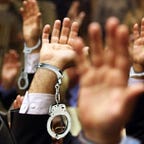Sorin Oprescu: The Godfather of Contemporary Romanian Medicine
An old Japanese saying advises, “Better be proficient in one art than a smatterer in a hundred”. As Sorin Oprescu has certainly found out, there is more than a grain of truth to this. Then again, as he and the citizens of Bucharest have also seen, it’s easy to diversify your portfolio if there’s nobody to assess your performance and you’re getting filthy rich in the process.
Sorin Oprescu is a Romanian doctor-cum-politician that’s held several high medical and political roles in Bucharest, right up to the beginning of his criminal prosecution for bribe-taking in 2015. Born to a high-class family at the height of the Communist regime, he saw his father rise to power as a Securitate General. Oprescu was also friends and next-door neighbours with Nicu Ceausescu, the son of dictator Nicolae Ceausescu. However, he set himself apart by pursuing a hugely successful medical career.
Medical history
Oprescu declared that he set his mind to become a doctor in high school: “I’ve wanted to become a surgeon, and a good one at that, after I read “A Surgeon’s Life” in 9th grade. I made it to the top. I’ve worked hard, so I feel at peace from this point of view.” He did, in fact, make it to the top of Romanian medicine. He is a well-known surgeon who has published over 200 articles on medical topics, both in Romania and abroad. He is a university professor-doctor at the “Carol Davila” University of Medicine and Pharmacy in Bucharest and a member of the University’s Senate. (This later enabled him to retain his right to operate, even though he had a criminal record.)
More importantly, he acted as Director of the Emergency University Hospital in Bucharest (the Municipal, as it’s commonly called by locals) from 1994–2006 and of the Elias Hospital from 2001–2005. During his time at the Municipal, Oprescu seems to have used his PSD senator position to modernise it, a management style that seems to have been appreciated by hospital employees. At the time, patients had enough sanitary materials, the hospital was modernised and consolidated, and medicine was easy to come by. Today, salaries are 40–50% lower and patients have to buy pills, bandages, saline solution and other medical necessities themselves. Oprescu has also mentored several doctors who went on to become top surgeons.
Even after his arrest, the long shadow of Oprescu hangs over the Municipal. Doctors say that after the new Social Democratic Party (PSD) Government was appointed in November 2016, Sorin Oprescu has been running the hospital from behind the scenes. His lover was appointed as the new manager of the hospital, without having had any relevant experience prior to her naming and without competing against other candidates. Other close friends of Oprescu’s also took up roles at the hospital — Bogdan Hreapca, who had been the investment director at the city hall, became the chief of purchasing; Luminita Zamrii, who had worked at the private clinic owned by the Oprescu family, became the Care Director; the medical director Dorin Ionescu became the Technical and Investment Chief; and Florian Popa, Oprescu’s “blood brother”, was appointed manager of the hospital’s board.
Political history
In the early 2000s, Oprescu grafted a political career onto his medical achievements. He became a member of the Romanian Social Democratic Party, later renamed to the Social Democratic Party. He was elected senator twice, serving between 2000–2004 and 2004–2008, and kept in touch with the Romanian medical system by acting as vice-president of the Public Health Commission during his two mandates.
Soon enough, he focused exclusively on politics, especially on the Bucharest City Hall. He ran for this position and lost twice, including to Traian Basescu, who eventually went on to become President. In April 2008, Oprescu went solo and won the city hall elections independently from PSD. In 2012, he was re-elected with 54.79% of the cast votes, partly thanks to a series of infrastructure projects that he had completed or promised to complete in due time, such as the Basarab Overpass. However, when he set his sights on a higher role, he took quite a sharp fall. In 2009, Oprescu ran for President and only managed to come up sixth, with a meagre 3.18% of the total votes.
The Big Boss
Then came the dark year 2015. On March 27th, 2015, the Roman-Catholic Archdiocese in Bucharest filed a penal complaint at the National Anticorruption Directorate (DNA) against Sorin Oprescu. They were accusing him of having formed a criminal group together with several businessman and employees of the Bucharest City Hall to delay the execution of the court sentence mandating the demolition of Cathedral Plaza — a skyscraper that had been illegally built right next to the St. Joseph Cathedral. The building still stands today.
This prompted an investigation that got traction when the former doctor was caught receiving a 25,000-euro bribe at his home in Ciolpani, a town 35km away from Bucharest. According to the DNA’s press release, between 2013–2015, a group of public servants at the Bucharest city hall had granted public contracts in exchange for between 30%-33% of each contract’s gross profit, with 10% being reserved for the mayor.
According to case witnesses, Oprescu had acted with surgical precision to prevent being caught. He was called “The Big Boss” in phone conversations and asked for remissions by saluting his interlocutors with a playful “see you in the field” — an allusion to his house, placed in a rural area. Then, the giver would enter his living room from the kitchen, leave their phones inside a cell phone jamming device, and drop the money, previously placed inside a gift bag, under a sofa pillow.
The case is still unfolding. In the meantime, Oprescu is back at the operating table. One can only hope that his abilities as a surgeon have been strengthened by the long years of manipulating financial tables at the Bucharest city hall.
